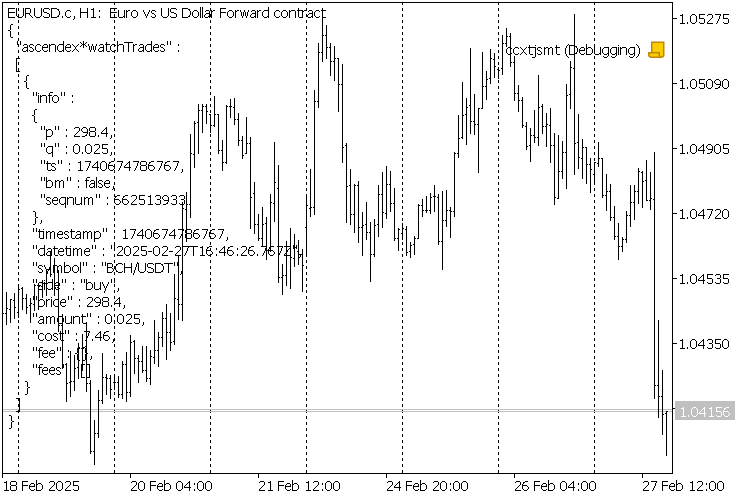Newest beta-version of CcxtAppServer library contains optimized caching of alternate “markets” (instrument specs and different buying and selling situations), much less reminiscence footprint throughout parsing of big json-files, higher error dealing with, and new examples.
This blogpost will current an introductory showcase with most necessary capabilities from public APIs – the script CcxtAppSrvShowcase.mq5.
First, embody the headers.
#embody "ccxtjsmtlib.mqh" #embody "ccxtutil.mqh"
Within the inputs, the Node server setup needs to be carried out (by default, it is localhost and port 8124).
enter group "Connection settings" enter string NodeServer = "http://127.0.0.1:8124"; enter string NodeAuth = "";
Subsequent, present a selected alternate you wish to work with. Depart the enter empty to view a printout with an inventory of all supported exchanges.
enter string Change = "";
Additionally present a ticker you are fascinated with. If you do not know the identify, run the script first time and have a look at MQL5/Information/CCXT/ folder the place all obtained information is dumped by default, so you’ll find json-files with full markets data.
enter string Ticker = "BCH/USDT";
For watching assessments (subscriptions through websockets) specify their period:
enter uint WatchingDuration = 10;
The script demonstrates how you can setup credentials for personal APIs, however won’t use any non-public operate.
enter group "Change settings (Personal API)" enter string ApiKey = ""; enter string Secret = ""; enter string Uid = ""; enter string Login = ""; enter string Password = "";
Further settings permit you to management the logging degree, dumping of all obtained information, and timeouts.
enter group "Auxiliary settings" enter ushort Logging = 1; enter bool Dumping = true; enter uint Timeout = 5;
Then the primary occasion handler OnStart comes into play. The imported capabilities, courses and strategies from the library are highlighted in yellow. Some elements are omitted for brevity (for particulars have a look at the total supply code, distributed with the library).
Inline feedback are self-explanatory, I feel.
If the script is operating very first time, it is going to ask to unpack (manually) CCXT Utility Server (extracted as ccxtappsrvbundle.jsc from a built-in useful resource), and run Node.js with it.
void OnStart() { PrintFormat("CCXT AppSrvLibrary model: %.2f", AppSrvLibraryVersion()); const static string standing[] = {"Cannot deploy", "App server ZIP is deployed, however not extracted", "App server recordsdata are deployed"}; const int d = DeployCcxtAppServer(); Print(standing[d + 1]); if(d <= 0) { return; } SetNodeServer(NodeServer, NodeAuth); CcxtLink::Settings settings = {Logging, Dumping, Testing, Timeout, 0}; CcxtLink *hyperlink = GetLink(); hyperlink.applySettings(settings); if(!StringLen(Change)) { Print("Full checklist of exchanges:"); Print(ListExchanges().stringify()); Print("Professional checklist of exchanges with websockets help:"); Print(ListExchanges(true).stringify()); Print("App Server Model: ", AppSrvVersion().stringify()); Print("CCXT lib model: ", CcxtVersion()["version"].stringify()); return; } CCXT::Credentials credentials = {ApiKey, Secret, Uid, Login, Password}; CcxtJsExchangeProIntf *ccxt = CreateExchangePro(Change, credentials, false); AutoPtr<CcxtJsExchangeProIntf> auto(ccxt); if(hyperlink.getLastHttpCode() != 200) { return; } const bool isPro = !!*ccxt["pro"]; if(ShowExchangeProperties) { Print("Is professional: ", isPro); Print("Required Credentials:"); ccxt["requiredCredentials"].print(); Print("Supported options:"); ccxt["has"].print(); AutoPtr<JsValue> f = ccxt.get("amenities"); Print("Amenities: ", f[].stringify()); } AutoPtr<JsValue> examine = ccxt.get(); if(Dumping) DumpJsonToFile("CCXT/check-" + Change, examine[]); if(ccxt.name("now").t != JS_PRIMITIVE) { ccxt.loadMarkets(false , false ); JsValue *data = ccxt.get("markets"); if(Dumping) DumpJsonToFile("CCXT/onlymarkets-" + Change, data); } else { Print("Markets are already loaded on Node"); } JsValue *orderbook = ccxt.fetchOrderBook(Ticker, 10); if(Dumping) DumpJsonToFile("CCXT/orderbook-" + Change + "-" + Escape(Ticker), orderbook); JsValue *ticker = ccxt.fetchTicker(Ticker); if(Dumping) DumpJsonToFile("CCXT/ticker-" + Change + "-" + Escape(Ticker), ticker); JsValue *ohlcv = ccxt.fetchOHLCV(Ticker, "1m", t ? t - 1000 * 60 * 10 : 0, 10); if(Dumping) DumpJsonToFile("CCXT/ohlcv-" + Change + "-" + Escape(Ticker), ohlcv); JsValue *trades = ccxt.fetchTrades(Ticker, t ? t - 10000 : 0, 10); if(Dumping) DumpJsonToFile("CCXT/trades-" + Change + "-" + Escape(Ticker), trades); if(!!*ccxt["has"]["fetchBidsAsks"]) { string array[] = {Ticker}; JsValue *bidsasks = ccxt.fetchBidsAsks(array); if(Dumping) DumpJsonToFile("CCXT/bidsasks-" + Change + "-" + Escape(Ticker), bidsasks); } ccxt.fetchAnything(NULL); ...
The requested URLs and corresponding names of saved recordsdata are proven within the log.
And now goes the CCXT PRO half based mostly on websockets and stay notification subscriptions.
if(isPro && ccxt.improve()) { ccxt.watchOrderBook(Ticker); ccxt.watchTrades(Ticker); string tickers[] = {Ticker}; ccxt.watchBidsAsks(tickers); ccxt.watchTrades(Ticker); const uint begin = GetTickCount(); whereas(!IsStopped() && ccxt.isConnected() && (!WatchingDuration || GetTickCount() - begin < WatchingDuration * 1000)) { AutoPtr<JsValue> j = ccxt.readMessage(); if(j[]) { Remark(j[].stringify()); } else { } } } else { if(isPro && ccxt.isConnected()) { Print("Cannot improve to websockets"); string headers[][2]; if(ccxt.ws().getHeaders(headers)) { } ccxt.ws().shut(); } } if(ccxt.isConnected()) { Print("Unsubscribing..."); ccxt.un().watchOrderBook(Ticker); ccxt.un().watchTrades(Ticker); ccxt.un().watchBidsAsks(); ccxt.un().watchTrades(Ticker); const uint begin = GetTickCount(); whereas(!IsStopped() && ccxt.isConnected() && (GetTickCount() - begin < 5 * 1000)) { Print("studying..."); AutoPtr<JsValue> j = ccxt.readMessage(); if(j[]) { Remark(j[].stringify()); } else { break; } } Print("Closing..."); ccxt.shut(); whereas(!IsStopped()) { AutoPtr<JsValue> j = ccxt.readMessage(); if(j[]) { Remark(j[].stringify()); } else { break; } } } }
When the script is operating, all incoming websocket information is proven as feedback on the chart (although the data can replace in a short time).

The CCXT Utility Server Library is at the moment in beta-stage and obtainable for testing upon request.



























